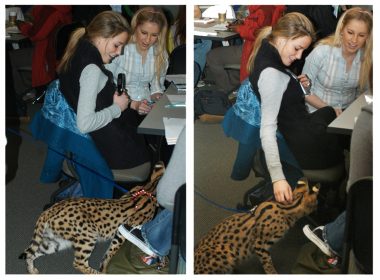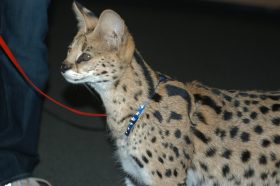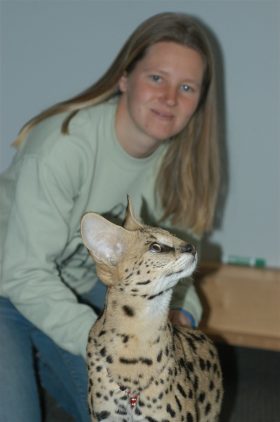African wild cats represent species of animals whose survival is threatened by loss of habitat, disease, or unrestricted hunting.

Two African servals quietly prowled through Jeffrey Coker’s biology class Monday as Elon professor and part-time conservator Kim Pyne described efforts to save threatened and endangered animals.
Coker’s course, “Reinventing Life,” takes an unusual approach to teaching introductory biology by focusing on biological change in the 21st century. The curriculum includes cutting-edge examples of biological change, discussions on bioethics, a biological design project, and an emphasis on inquiry and active learning.

The associated lab involves four multi-week experiments that are designed, implemented, analyzed, and presented by the students. Although the curriculum stems from fundamental biological concepts and proven teaching methods, Reinventing Life attempts to stretch 10-100 years into the future in both areas to address the societal shifts of the future.

The servals’ visit was arranged by the Conservators’ Center, a rescue and conservation facility where Pyne and her husband actively volunteer. The Center is dedicated to responsible captive breeding of selected species. It practices conservation breeding, which is important to maintain species of animals whose survival is threatened by loss of habitat, disease, or unrestricted hunting. The group, based in Mebane, also offers educational programs and rescues and places animals in need. Servals are a protected species in most of the world, due to hunting its pelt, and to human population taking over its habitat.

Coker is an assistant professor of biology at Elon. He recently completed a two-year research and development project sponsored by the Center for the Advancement of Teaching and Learning (CATL). As a CATL Scholar, Coker worked to further develop Reinventing Life as a transformational experience for non-majors Biology at Elon.


